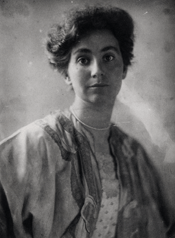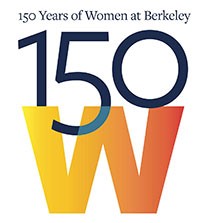Lucy Sprague: First Woman on the Berkeley Faculty (1906-1912)

By Amanda Styles
 Among the many female faculty members of the English department throughout its history, Lucy Sprague Mitchell stands out as the one who never focused her studies in English. She majored in philosophy during her undergraduate education at Radcliffe (the female “annex” to Harvard). Sprague’s six years in the Berkeley English Department as an Assistant Professor came about not because she was an academic with a strong background in literary studies but because the president of the university thought she would make a good Dean of Women. In 1903, when Sprague was still living in Cambridge, Massachusetts, President Benjamin Ide Wheeler, who had recently met her, asked if she would be interested in a position working with the women students at Berkeley. Sprague accepted on the condition that she be given a teaching position in order to hold an appropriate rank, and Wheeler assented. The question of what subject she would teach came later. In her first three years at Berkeley, Sprague served a trial period in which she took graduate classes, assisted in teaching courses, and figured out what the needs and duties of a Dean of Women might be. She began the fall of 1903 as a reader in the Department of Economics before working in 1904 as a reader in the English Department. From there she became an Instructor and finally, in 1906, an Assistant Professor of English.
Among the many female faculty members of the English department throughout its history, Lucy Sprague Mitchell stands out as the one who never focused her studies in English. She majored in philosophy during her undergraduate education at Radcliffe (the female “annex” to Harvard). Sprague’s six years in the Berkeley English Department as an Assistant Professor came about not because she was an academic with a strong background in literary studies but because the president of the university thought she would make a good Dean of Women. In 1903, when Sprague was still living in Cambridge, Massachusetts, President Benjamin Ide Wheeler, who had recently met her, asked if she would be interested in a position working with the women students at Berkeley. Sprague accepted on the condition that she be given a teaching position in order to hold an appropriate rank, and Wheeler assented. The question of what subject she would teach came later. In her first three years at Berkeley, Sprague served a trial period in which she took graduate classes, assisted in teaching courses, and figured out what the needs and duties of a Dean of Women might be. She began the fall of 1903 as a reader in the Department of Economics before working in 1904 as a reader in the English Department. From there she became an Instructor and finally, in 1906, an Assistant Professor of English.
It is not, though, simply by accident that the English Department can claim ownership of the first female faculty appointment at Berkeley. Her departmental assignment was not quite as random as it might at first appear. Sprague’s faculty status was important because it granted her the power to enhance the lives of the female student body, and it set a precedent for her successors. And being associated with literature, especially poetry, also turned out to be a practical advantage to her deanship.
At the beginning of the twentieth century, departmental disciplines were often not very rigidly defined, and as a product of the Harvard philosophy faculty, Sprague’s college education had been remarkably wide-ranging, even including quite a bit of British literature. George Herbert Palmer, the Harvard philosophy professor who was most important to her education (during her college years and in those immediately following), was especially interested in literature. He had trained in classics and had done a famous translation of Homer’s Odyssey. Sprague lived in his home while a student, was an intimate friend of his wife, and even served as an unofficial research assistant for his scholarly work on the seventeenth-century poet George Herbert, so she had experience in literary scholarship even though she’d been a philosophy major. In her memoir, Sprague writes, “I took several courses in English Literature at Radcliff, but my real education came through Mr. Palmer’s readings” (124). Each evening George Palmer read poetry to Lucy and his wife, Alice Freeman Palmer, who had been both the President of Wellesley College and the Dean of Women at the University of Chicago. Even after Alice Palmer’s death, Sprague continued for a time to live in their house and serve as assistant to George Palmer, so she was immersed in literary culture and scholarship.
Sprague’s academic interests, like those of both Palmers, were not limited to a single subject, and she later came to hold the belief that without breadth one could not be a good teacher. She later became an influential educational theorist, stressing the education of both the “whole child” and the “whole teacher”. A remark George Palmer once made about himself would resonate throughout Sprague’s career: “I do not teach Greek. I teach boys. Greek is what I start with.” Sprague might have described her own teaching at Berkeley in a similar way: she aspired to teach young women, and poetry was where she started. Mere subject matter, in other words, was of secondary importance, and narrow specialization destroyed creativity.
Since Sprague had no predecessor when she became Berkeley’s Dean of Women, she was free to define the position as she saw fit. Many of her male colleagues thought the women students were a distraction to the men, and they had wanted the matronly presence of a Warden of Women. They were disappointed when Sprague, an unmarried twenty-five-year-old, was appointed. In contrast to the forbidding authority figure some desired, Sprague cultivated a public image as a wise but compassionate and trustworthy mentor and advisor. She tried to create what she referred to as a “Heart Culture” (an idea taken from her mentor Alice Palmer) within the female student body, aiming for affectionate bonds among the students that would inspire achievement and raise their morale.
Sprague detected the lack of a female community at Berkeley, and to create a sense of friendly camaraderie among the students she began hosting frequent receptions at her home; there were refreshments and, importantly, poetry readings. George Palmer’s nightly readings served as a model, and her practice of simply reading poetry to the students may have inspired her later theoretical ideas about the poetic qualities of language generally, its rhythms, sounds, and movement, which make it central to all other learning. In her faculty capacity, she did teach some freshman seminars, similar to the modern-day equivalent of R1A&B, and later classes on versification and poetry for female students. Some of that training paid off when she suggested that the women students as a whole could raise their stature on campus by creating a massive poetic pageant. The students enthusiastically brought the idea to reality in The Parthenia, which paid tribute to various important female figures in history. It was entirely designed, constructed, and performed by hundreds of women students, and it was completely written in verse by one of them.
Sprague’s literary ventures were only parts of her greater mission, which was to expand the cultural, intellectual, and vocational horizons of the women. Upon entering her position, Sprague noticed that 90% of her students were preparing for careers in teaching, even though many of them did not possess much interest in the occupation. They simply thought there were no alternatives. Consequently, she sought to prove this conception incorrect, taking many of her students to various establishments in Oakland and San Francisco where women were engaged in social work, medicine, and other vocations.
Perhaps the most unusual evidence of Lucy Sprague’s holistic care for the women students was her course on sex education. With the 2,000 women and 5,000 men on campus, sexual health was an essential topic of discussion. With the help of Dr. Elanor Bancroft, the women’s physician for the university, she taught a course on women’s reproductive health and hygienics. By today’s standards the course was quite basic, focusing on the stages of pregnancy as well as precautions against sexually transmitted diseases, but for the time it was revolutionary. In her memoir Sprague stated, “Of all the queer things I was called upon to become at Berkeley at the age of twenty-seven, I think becoming a specialist on sex diseases was the queerest” (Sprague Mitchell, 200). Obviously, she would rather have been teaching poetry.
After a total of nine years of living in Berkeley, and six working as the Dean of Women, Sprague decided to leave the University of California to live in New York with her new husband, Wesley Clair Mitchell (1912). There she opened Bank Street College in 1913 (later referred to as the Bureau of Educational Experiments), a school that worked on developing an experimental curriculum that could later be adapted by broader education circles. At Bank Street, she built on what she’d learned Berkeley. As in her time here, she strove to create a system of interactive learning as well as a culture of connection with colleagues and students. She pioneered the idea of “teaching the whole child” and extended it to “teaching the whole teacher,” when her curriculum expanded to prepare educators. Sprague Mitchell strongly believed in the power of children’s observational skills as well as their ability to make connections by reflecting on their own experiences. For these reasons, she continued to focus on the poetry of language and the need to explore one’s own surroundings.
Despite being a short chapter of Sprague Mitchell’s life, her Berkeley years left a deep imprint on her future research and writing. Of course, Berkeley was where she met her husband “Robin” Mitchell, but it was also the place where she first experimented with educational practices and concepts, and discovered a problem that affected the whole education system: lack of other career opportunities for women sent many into teaching jobs they didn’t really want. Sprague Mitchell’s faculty appointment in the English Department also allowed her to teach the poetry she loved, and it may have started her investigations into the poetic, experiential, aspects of all language learning.
Supplementary Reading Material
For further information on the life and career of Lucy Sprague Mitchell at UC Berkeley and beyond, consider reading her 1953 autobiography and husband’s biography: Two Lives; the Story of Wesley Clair Mitchell and Myself. Brandeis University Professor Joyce Antler has also composed a thorough account of Mitchell’s life and research in her 1987 biography: Lucy Sprague Mitchell: The Making of a Modern Woman.
Works Cited
Antler, Joyce. “Feminism as Life-Process: The Life and Career of Lucy Sprague Mitchell.” Feminist Studies, vol. 7, no. 1, Spring 1981, pp. 134–157. EBSCOhost, search.ebscohost.com/login.aspx?direct=true&db=ahl&AN=46046192&site=eds-live.
Downs, Roger M. “Meeting the Challenge of Systemic Change in Geography Education: Lucy Sprague Mitchell’s Young Geographers.” Journal of Geography, vol. 115, no. 1, Jan. 2016, pp. 3–11. EBSCOhost, doi:10.1080/00221341.2015.1017516.
Field, Sherry L. 1.Sherry_Field@austin.utexas.ed., and Michelle2, m.bauml@tcu.ed. Bauml. “Lucy Sprague Mitchell.” American Educational History Journal, vol. 38, no. 1/2, Spring 2011, pp. 111–125. EBSCOhost, search.ebscohost.com/login.aspx?direct=true&db=eue&AN=64872916&site=eds-live.
Frank, Jeff. “The Significance of the Poetic in Early Childhood Education: Stanley Cavell and Lucy Sprague Mitchell on Language Learning.” Studies in Philosophy & Education, vol. 31, no. 4, July 2012, pp. 327–338. EBSCOhost, doi:10.1007/s11217-011-9275-2.
“Lucy Sprague Mitchell: Founder of Bank Street College.” Early Childhood Today, vol. 15, no. 7, Apr. 2001, p. 46. EBSCOhost, search.ebscohost.com/login.aspx?direct=true&db=brb&AN=507763310&site=eds-live.
Mitchell, Lucy Sprague. Two Lives; the Story of Wesley Clair Mitchell and Myself. Simon and Schuster, 1953. EBSCOhost, search.ebscohost.com/login.aspx?direct=true&db=cat04202a&AN=ucb.b10024873&site=eds-live.
https://en.wikipedia.org/wiki/George_Herbert_Palmer).
Solomon, Barbara Miller. Nation, vol. 244, no. 20, May 1987, p. 690. EBSCOhost, search.ebscohost.com/login.aspx?direct=true&db=f5h&AN=12540762&site=eds-live.
